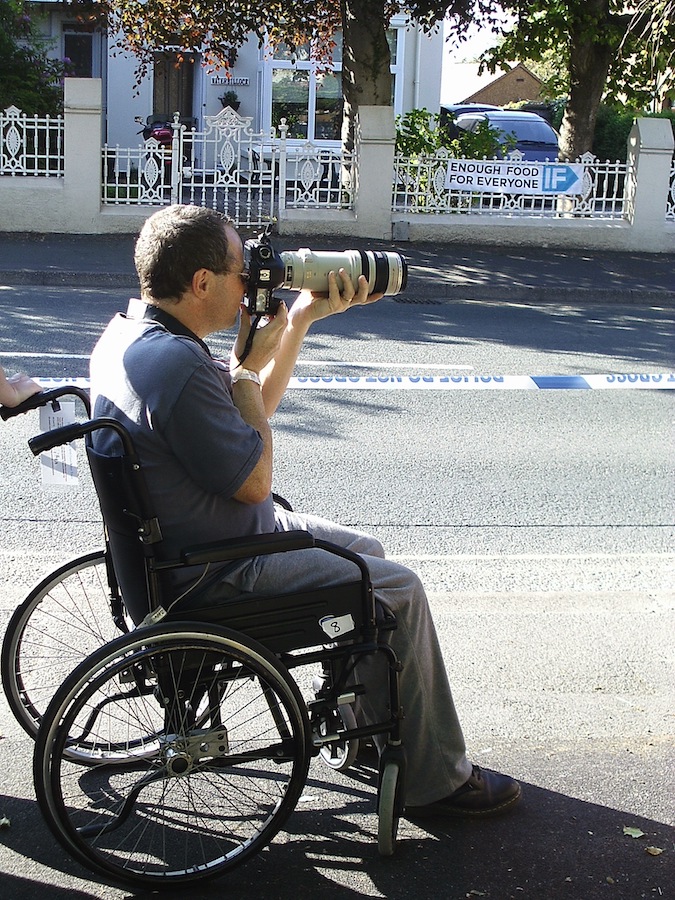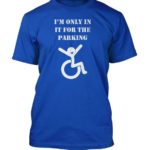I’ve often thought about ‘The Psychology of Disability‘, in particular, how to cope with the mental impacts of acquiring a disability. It’s come up a few times in the last week. What I really don’t know is how to distill it down from a subject that could fill a book, to a five minute read on a blog? To try and keep it manageable (and hopefully interesting!) this will be a ‘two part’ blog. Part one will be a bit about more personal, some of the things I did, that worked for me. Part two, next week, will be some observations about others.
As a psychiatric nurse (‘Registered Mental Nurse’) the mental health side of disability interests me. I genuinely believe that people who acquire a disability should automatically be offered a referral to mental health support. Sadly of course, with mental health services stretched & underfunded, the last thing they need is to go looking for additional work!
When I was in rehab after acquiring my disability, psychological support was provided. On arrival at the unit, I had a chat with my psychologist and we agreed that I would recognise if & when I required her support and would come to her, rather than having formal structured sessions. Most of the time, I managed myself, finding ways to keep on track and motivated & focussed on my rehabilitation, while accepting my disability. However on one occasion, after a pretty major disagreement with the care team, I was left feeling angry, frustrated and upset. I went to Sam’s office. She was eating her lunch. I said I’d come back later, but she put her food to one side and told me to come in. I said to her, “actually, you can carry on eating, I just need to vent”. I asked her if she was okay with the occasional swear word? Obviously she was, so I just growled and grumped, with liberal use of the ‘F-word’. Sam just sat there, consuming her home prepared salad from a Tupperware box. Eventually I ran out of energy. Sam asked me if there was anything she could do for me? I said ‘no‘, then apologised for interrupting her lunch and left. I didn’t need anything ‘doing’, I simply needed someone to listen. Having had a rant, I was okay to carry on with the rehab sessions in the afternoon.
One ‘trick of the mind’ that I worked out quite early on was how to answer a simple question…
“How are you?”
On most occasions, this is simply an informal greeting, people don’t actually want to know how you are, it is just another way of saying ‘hello’. But when you are in hospital, your visitors and professionals are generally asking you, wanting more information. In the very early days, someone asking “how are you?” instantly had me thinking back a week or so, to when I’d walked in to hospital for what was billed as a routine operation. In my head, the answer was therefore “a bit shit really”, regardless of the words that my mouth produced. Thinking that way would drag me down psychologically. I recognised that I would never return to the position I had been in prior to the operation, so for the rest of my life, the answer would only ever be “a bit shit really”.
I decided I needed to reframe the reference in my own mind. Whenever someone asked me ‘how are you?‘ I consciously brought to mind my first physiotherapy session after becoming disabled. I had to pull myself up using the bed-rails. I then leant down to push my dead-weight legs off the side, before shuffling my body around ninety degrees, until I was sitting on the edge. I had a physiotherapist and his assistant there, supporting me, otherwise I would have gone headlong off the bed. Having steadied me, I then had to lay back down, hauling my legs back up and straightening my damaged body out. I did that twice in forty-five minutes and I was sweating. From being able to walk miles with my dogs literally a week earlier, I was now exhausted by sitting on the edge of the bed.
When we finished, the physio said “don’t worry, we’ll get you walking again”.
I didn’t believe him.
That was the lowest of the low. In order to reframe the question, when people asked me how I was, I instantly pulled in to my mind that first physiotherapy session and how exhausting it was. I could then begin answering “I’m doing really well”. For many months after becoming disabled, well after finishing rehab and returning home, I still thought about that session when people asked me how I was doing. One thing I didn’t appreciate at the time was how this answer freaked other people out! They thought I was in denial or shock, or lying or trying to be strong. In reality, I’d simply changed the way I viewed the question.
One of the things that got me through was music, in particular a couple of specific tracks, that had lyrics that really resonated. The first one was Noah & the Whale’s L.I.F.E.G.O.E.S.O.N. I’d wake up in the morning and put this on the headphones, blasting it out, sometimes two or three times in quick succession.
L.I.F.E.G.O.E.S.O.N.
You’ve got more than money and sense, my friend
You’ve got heart and you’re going your own way
L.I.F.E.G.O.E.S.O.N.
What you don’t have now will come back again
You’ve got heart and you’re going your own way
On my last night on earth, I want to look to the sky
Just breathe in the air and blink in the light
On my last night on earth, I’ll pay a high price
To have no regrets and be done with my life
Later, I picked up on One Republic’s ‘I Lived’. Between these two songs, if I needed motivation, I got it. With the One Republic song, it wasn’t just the lyrics, as powerful as they were, but the video itself.
Returning to my grumping at the psychologist and the reason for the bad mood…
When I was still on the ward, before going to rehab, I set myself the target of getting back to the Isle of Man for TT 2013 and taking a photo of a race bike that was as good as I’d taken previously. Prior to becoming a wheelchair user, I used to get a press pass for the races and regularly had photos published, so this was an important goal for me.
As time got closer, it was clear that I couldn’t do an entire fortnight, or even week, so I narrowed it down to seeing the Senior Race. When the prospect of going on leave was discussed with the team, they said no, because the travel hadn’t been Risk Assessed. I was so frustrated. I pointed out that I’m a qualified Risk Assessor myself and that I’d done the journey hundreds of times. I also said that unless one of them was planning to come with me when I was discharged, the first trip was never going to be Risk Assessed. The rehab unit was in Liverpool. Most people lived locally, so those who were well enough went home at the weekend and no therapy took place then, so the weekends were incredibly boring and quite depressing. I shared with them that it was also about achieving a personal goal, so it was important to me on that level too. Tough, they remained adamant that it shouldn’t happen.
My Consultant was on leave for that meeting. When he returned, he came to see me and asked how I was? I replied “that depends who you’ve been talking to?” He laughed and we discussed the frustration regarding the not being allowed on leave. He said that I could discharge myself, against medical advice, but I knew that would be ‘cutting my nose to spite my face’ as I needed to continue with the rehab. He then said that he’d be prepared to keep my bed open and allow me to go “on leave against medical advice.” Great! Let me sign the form… He then admitted that no such form exists! I wrote and signed a statement, saying that I understood this was against advice, and off I went.
I stayed at the Joey Dunlop Foundation Lodge. I wrote a review on Trip Advisor at the time and I’ll hopefully do an update for the blog at some point in the future. If you are a person with a disability, wanting a holiday on the Isle of Man, give them a call, it is an excellent facility.
I managed to get to the TT Senior Race Day, 2013.
Conor Cummins is a top TT Racer. If his name doesn’t mean anything to you, take a minute to watch this video, then continue reading: It will make more sense if you do!
That was in June 2010. Despite massive injuries, by June 2011 Conor was at the TT, racing again.
I got my photos, including a shot of Conor that I printed out and took back to the rehab unit with me. I put it on the wall and if I needed a push, I’d look at the photo and remind myself what a great photographer I am… oh, sorry… what Conor’s grit & determination achieved. I was happy with the photos that I took, so that was a first goal ticked.

Sometimes, the little voice in my head was useful, either encouraging or critical. It may sound strange, but on occasions, it was like that voice came from somewhere else in my mind, not being conscious thought. Two instances stick out from rehab. On one occasion, I was having a fed up & grumpy Sunday. The people I could chat to were on leave for the weekend. My wife could only visit every other week or so, and couldn’t be there that week and I wasn’t due any visitors. I just couldn’t be bothered getting up. I’d forced myself to get dressed from literally a few days after becoming disabled. But on this particular Sunday, I was wallowing in self-pity. About 7pm, the little voice piped up, “well there’s a day of your life you won’t get back”. I didn’t do that again. The other occasion was equally helpful but in a different way. I was progressing well with physiotherapy. They had a stairs set up, four or five stairs leading up to a platform, then at ninety degrees, some more steps going back down. I had begun by climbing them using both banister rails, turn around and come down. Then progressed to using one stick and a rail. Now, for the first time, I was only using the two walking sticks. I slowly but steadily climbed the stairs and turned around. I was now on the platform, looking down. You’ve no idea how high & steep a few steps are until you’ve forgotten how to walk down them. My feet felt like lead weights. I couldn’t move them at all. I was terrified and convinced I would fall. No matter how I tried, I’d hit a wall and couldn’t move. Then my little voice popped up. My physiotherapist was great. An excellent physio, she was also a lovely person, funny & friendly. She was also a pretty young blonde woman. As I stood there, fixed to the floor, she was standing at the bottom of the steps, encouraging me down. From somewhere, my helpful little voice piped up “just get on with it. The worst thing that can possibly happen is you fall and land on top of a pretty blonde girl.” …that was all the motivation I needed! And of course I didn’t fall, she knew that I was able to do it or she wouldn’t have told me to do so!
I had other ‘mind games’ that I played with myself, giving my own therapy sessions. One other that was significant during rehab was that the war in Syria was just beginning to gain wider coverage and the bombing of Aleppo was intense and horrific. I summoned up an image of a Syrian man, having acquired life changing injuries in the bombing. While the dead were counted, those who had become disabled were barely registered. I pictured ‘my imaginary friend’, who had been injured in bombings during that May. He hadn’t got access to rehabilitation. No physio & Occupational Therapy. No Ankle Foot Orthotics to help with standing & mobilising. He would be lucky to have a battered old wheelchair. If I was struggling to motivate myself to attend my own challenging therapy sessions, I pictured my imaginary Syrian friend and reminded myself of the opportunities that I had, that he was denied. That motivated me not to waste this critical time.
Finally, I’ve never been someone who worries or dwells upon what has happened. I’m firmly of the view that I can’t change what has happened, only what I do about it. To this end, instead of ‘why me‘, I considered myself lucky. It probably sounded like an odd thing to say, but I knew that (for example) because of the job I did, I could return to work as a wheelchair user. With the client group we supported, I already had wheelchair accessible toilets and my office was accessible. In under six months, I was back at work. When I was in rehab, there was a bloke there. He was in his mid-thirties. He’d had a series of headaches, which, being a bloke, he ignored for quite a while. Eventually, he went to the doctor and had scans. They found a ‘space occupying lesion’… a growth in the brain. Apparently he was told that if it wasn’t removed, he would die. If it was removed, it would be impossible to take out without causing some damage, and they couldn’t predict what the damage would be, they’d have to wait and see what happened when he woke up. I can’t even imagine how frightening that must have been, going down to theatre, knowing that your life was going to change but not knowing how? As it was, he was incredibly lucky. He ‘only‘ lost the use of his left arm, but everything else was fine. The operation was a great success and relatively, the damage was minimal.
But he was a self employed electrician, with a young family and no insurance. There isn’t much of a market for one handed electricians. This was his job gone. No livelihood. His wife had not been working, staying home to bring up the young children. Physically, he probably didn’t need to be in rehabilitation but emotionally, he needed all the support that he could get. In terms of physical disability, mine was more severe than his. In terms of the impact upon our lives, I was the lucky one.
Sometimes, it is simply how you mentally frame it.
Sometimes, it is learning how to frame it.
Sometimes, it is working out a way to remain focused.
And sometimes, you just need a damn good rant!


